undocumented
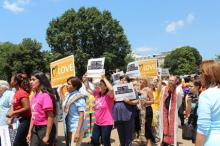
In the face of an imploding immigration system, an exploding political debate and a deadlock on reform in Washington, it was religious leaders who rallied to form a humanitarian response to the surge of unaccompanied children crossing the border to the United States this summer.
The number of migrants crossing the border began its steady rise in 2011, but it escaped the Obama administration’s notice until spring, when the rise became a wave.
By September, 66,127 unaccompanied children and 66,142 Salvadoran, Guatemalan and Honduran families had crossed into the Southwest, mostly into the Rio Grande Valley. The flood contributed to a backlog in U.S. immigration courts of nearly 400,000 cases.
Nowhere was the religious leadership more apparent than in McAllen, Texas, where churches and local government forged an effective and compassionate response to the crisis.

My sons, Issac and Felipe are my pride and joy. My wife and I go to church with them every Sunday, and we spend our free time at the movies or enjoying a walk through downtown Chicago. We also take road trips, one of which brought us to New York City where we visited the Statue of Liberty and Ellis Island.
I brought them there because I wanted them to see
the most important American monument in person. The Statue of Liberty is the icon of freedom and a historic welcoming signal to immigrants.
Chicago is my home. It's been that way for the past 17 years. I'm a maintenance worker at a residential building and a member of SEIU Local 1. I'm kind of living the American dream. I say "kind-of" because my undocumented status has prevented me from pursuing better job opportunities. I had the chance to become an assistant engineer at my building but declined the offer because I'm scared of losing the job if my bosses discover that I'm undocumented.

Pulitzer Prize-winning journalist Jose Antonio Vargas, detained earlier today by border patrol at McAllen-Miller International Airport in Texas after having visited the border town‘s shelter for unaccompanied Central American refugees, has been released, reports say.
His trip included participating in a vigil to honor the children who have embarked on a dangerous journey to the U.S. to save their lives.
Vargas wanted to shed light on the crisis occurring at the border and highlight the need to address the issue in a humanitarian way.
“I’m the most privileged undocumented immigrant in the country," Vargas said to the Dallas Morning News on Sunday.
"And with that privilege comes responsibility—the responsibility of tying my specific story to the story of 11 million undocumented people like me and using every skill and resource I have to tell stories and insist that we talk about this issue humanely and fairly.”
Read the full story here.

Some of you may know the experience of having a secret about yourself that when revealed makes you have to completely reframe your identity. This happened for me in my junior year of high school when I was offered the opportunity to travel through a college bound program. That is when I learned I was “undocumented.” The reality of the broad impact of this label set in with each evasive answer my mother gave when I asked if I’d be able to not only travel, but drive, or work to help pay the bills. Being undocumented threatened my dreams of going to college; it threatened the possibility of a better future.
I was born in Mexico, and as proud as I am about my ethnicity, there is only one place I know as home, the United States. My father abandoned us when I was 3 years old and this set everything in motion that would lead me and my family to the U.S. When we struggled without his support, my older brother left for the U.S. in search of a better life at the age of 14. My mother’s love for her oldest son drove her to leave her home as well. When my brother learned she was considering leaving me, his young sister, in the care of my uncle while she visited him, he insisted she brought me along. I have now been in the U.S. for 25 years.
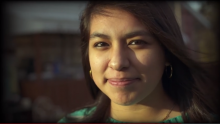
The people we meet change our lives. Through hearing the stories and learning about the lives of others, we are transformed. And, it is for exactly those reasons that I hope you’ll watch this short trailer and sign up to be one of the first people to watch The Stranger.
The Stranger is a new 40-minute documentary created to introduce Christians to the stories and lives of immigrants living in this country. Interviews with pastors, Christian leaders, and policy experts provide a biblically based context for the immigration challenges that face our country today. The film, commissioned by the Evangelical Immigration Table, was produced by Emmy-award winning producer Linda Midgett.
This President’s Day, about 20 church leaders, sympathizers, and undocumented immigrants were arrested in front of the White House as part of an act of civil disobedience to protest the nearly 2 million people who have been deported under President Obama.
The core group and about 40 supporters gathered around 1 p.m. on Monday afternoon in Lafayette Park in front of the White House. They held signs that said, “Praying for Relief” and “#Not1moredeportation,” and sang hymns in between short megaphoned speeches that told personal stories. They called for immigration reform. “Not one more, not one more,” they chanted together in both English and Spanish.
The event was organized by Bishop Minerva G. Carcaño of the United Methodist Church, who was the first Hispanic woman to be elected to her position.
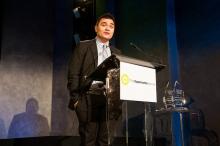
Last week, I attended a screening of Documented, Jose Antonio Vargas’ film about his coming out as an undocumented immigrant after winning the Pulitzer Prize. His journey is honest, poignant, and humorous. A lesser subject would have cut some of the material showing the strain of the situation on his familial relations, but the film never flinches from the raw story.
I sat in on a panel discussion after the screening filled with members of an organization featured in the film, “DREAMers Moms.” I had a chance to speak with several of them, and one story stuck out in particular. One mom left her country for the good of her children so they would have hope of a positive future in the United States. She hasn’t seen her mother in 13 years and won’t until immigration reform is passed into law. If she leaves the U.S., it’s likely she wouldn’t be allowed to return and care for her children. This would leave them essentially orphans who would be placed into foster care. Her mother is now in her 80s, frail and sick. This woman is losing hope of ever again touching the woman who cared for her, but still prays daily for a miracle.
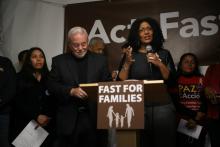
(Editors’ Note: Sojourners is running an ad in Rep. King’s district. Watch the ad and click here to learn more about it.)
Business leaders, law enforcement officials, and evangelical Christians—key constituencies that are typically part of the Republican base—have been at the forefront of immigration reform. Given the obvious benefits of, and broad public support for, immigration reform, why are many arch-conservatives in the House of Representatives refusing to address the issue in a serious way? The answer may point to an issue that we still hesitate to talk about directly: race.
Fixing our broken immigration system would grow our economy and reduce the deficit. It would establish a workable visa system that ensures enough workers with “status” to meet employers’ demands. It would end the painful practice of tearing families and communities apart through deportations and bring parents and children out of the shadows of danger and exploitation. And it would allow undocumented immigrants—some of whom even have children serving in the U.S. military—to have not “amnesty,” but a rigorous pathway toward earned citizenship that starts at the end of the line of applicants. Again, why is there such strident opposition when the vast majority of the country is now in favor of reform?
When I asked a Republican senator this question, he was surprisingly honest: “Fear,” he said. Fear of an American future that looks different from the present.

Editor's Note: In April, Associated Press representatives said they would no longer recommend the term "illegal immigrant" in the influential AP Style Guide used by many in print media. However, the term is still used by many media outlets and in common parlance. Our hope is that more will follow the AP's lead and rethink its usage.
As the Senate recently passed long awaited immigration overhaul and the bill now heads to the House, the long-standing national discourse on the issue of immigration will likely heat up again. As we participate in these discussions, my hope is that we, especially as Christians tasked with peacemaking and reconciling, will find ways to build bridges instead of erecting walls. As a first step in this bridge building, I pray that once and for all, we will stop using the term “illegal immigrant.”
Here's why:
1. The term “illegal immigrant” is a misleading and dishonest term, which violates the 9th commandment.
The term “illegal immigrant” lends one to believe that an individual is currently doing something illegal, or that their presence in our country is an ongoing, illegal act. In regards to undocumented workers, this is simply not the case. The crime that undocumented workers commit is a violation of “8 U.S.C. § 1325: Entry of Alien at improper time or place,” a federal misdemeanor. Their crime is crossing the border at the improper time and place; however, they are not currently doing anything that is illegal.
Therefore, using this term that has a less-than-honest connotation, is a violation of the commandment to not “bear false witness against our neighbors.”

At the Full Frame Film Festival in Durham last week, I saw Marco Williams’ new documentary, The Undocumented, which tracks migrants as they hike into the United States across the border between Mexico and Arizona, trying to escape the detection of border patrol agents, and trying to survive the deadly heat of the Sonoran desert.
The documentary follows a young man, Marcos Hernandez, as he tries to find his father, Francisco, who was last seen in the desert walking for days in the 120-degree summer heat. Francisco left their home in Mexico with a coyote — man he paid $2,000 to lead him across the border — to make enough money to pay for his son’s expensive dialysis treatments. But he never called; he never returned. The coyote reported that he left Francisco in the desert because he was sick and couldn’t keep up with the other migrants in the group. Marcos fears the worst — that his father died of dehydration, of heat exhaustion. But to confirm the death he has to find the body.
The filmmaker focuses on the morgue in Tucson, Ariz., where the medical examiner investigates human remains, looking for clues that would help identify the dead in order to return whatever is left to family members and friends, to provide some kind of closure, to honor the dead with a burial.
In the film, Marcos won’t believe his dad is dead until he can see his dead body, or whatever is left of his body — a skull, teeth, his rib cage. He will not believe unless he can see.
“Unless I see the mark of the nails in his hands, and put my finger in the mark of the nails and my hand in his side, I will not believe” (John 20:25). That’s what Thomas says to the other disciples about the resurrected Jesus; and what Thomas says about needing to see the body reminds me of the story of Marcos, about the need to see in order to believe.
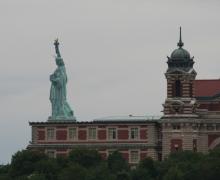
"'Lord, when was it that we saw you hungry and gave you food, or thirsty and gave you drink? And when was it that we saw yo a stranger and welcomed you, or naked and gave you clothing? And when was it that we saw you sick or in prison and visited you?' And the king will answer them, 'Truly I tell you, just as you did it to one of the least of these who are members of my family, you did it to me.'"
--Matthew 25. 37-40
All this immigration talk reminds me of an encounter my wife and I had at a fast food restaurant in Atlanta. The night manager was Hispanic. He came by our table to make sure everything was all right. We started talking. I told him how troubled I was over our immigration debate.
That casual remark opened his door wide. He told me how scared many of his friends were. Some had already left the state. He told me they only wanted to work and send money back home where things were so tight. One very sick friend, he said would not go to the doctor or hospital because she was afraid of being deported. He told me he kept reading that these immigration laws had nothing to do with racial profiling.
He shook his head. “I have been stopped six times in the last few months mostly because I was Hispanic.”

Last week, I attended the 9th Annual Immigration Law and Policy Conference at Georgetown University Law Center, where a number of senior government officials, policy experts, academics, and advocates discussed one of the most paralyzing issues of our time —immigration.
As each panelist attempted to provide their thoughtful legal and policy analysis on a number of issues like immigration enforcement, the federal government’s responsibility on immigration policy, and litigation developments, the differences in opinion between the speakers quickly emerged, even though there was consensus that immigration reform is significantly needed in our country.
Many agreed that the issue of immigration is of staggering complexity. The solution that is developed by the federal government must be a conglomeration of multifaceted mechanisms that address the brokenness of our current system at the policy, legal, and administrative level. This comprehensive solution must also be a clear reflection of the historical context we currently live in since it’s not in our best interest to use an outdated system from the past as an exemplary model for the future.

A soft answer turns away wrath, but a harsh word stirs up anger. Proverbs 15:1
I often wonder how frequently people think about the impact their words have on others, specifically, on the development of human perception. The conclusion I’ve sadly reached is that when a language norm is established by dominant cultural forces —such as the news media, in our day – the truth seldom matters. Once something is spoken and repeated enough times people consider it to be true regardless of the real facts or circumstances.
One recent debate clearly illustrating the power of words is around which terminology the media should use when referencing immigrants who are in this country without authorization to work. Those outlets that use the word “illegal” defend this practice by pointing to the Associated Press’ Stylebook, which designates “illegal” as the appropriate term. Those using the term “undocumented” have noted the changing circumstances within the culture and recognize that using such inflammatory terminology only adds fuel to the proverbial political fire around the issue of immigration.
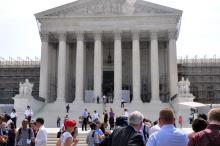
Brewer’s law had four legs. Now it has one—a lame one. The Supreme Court’s ruling was not a vindication of Brewer, rather it issued a death sentence for an unjust law. The law is not dead yet, but it may as well be a dead man walking.
Now, all eyes turn toward Congress.
Our U.S. Immigration system is still broken and something must be done. The Supreme Court has made it clear, that action must come from Congress. Now is the time for comprehensive immigration reform. Now is the time to declare, in concert with the Evangelical Immigration Table and the thousands of people who have signed the Statement of Principles for Immigration Reform, released two weeks ago today: “We call for a bipartisan solution on immigration that:
- • Respects the God-given dignity of every person
- • Protects the unity of the immediate family
- • Respects the rule of law
- • Guarantees secure national borders
- • Ensures fairness to taxpayers
- • Establishes a path toward legal status and/or citizenship for those who qualify and who wish to become permanent residents”
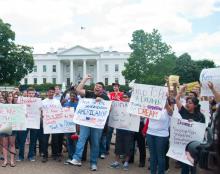
Dreams came alive today as President Obama granted relief to thousands of undocumented students. While the decision does not create a pathway to citizenship, it eliminates the threat of deportation for many unauthorized students and makes them eligible for work permits.
Sponsored by Casa de Maryland, a number of organizations—Amnesty International, Jews United for Justice, 32BJ SEIU, National Council of La Raza, and the National Gay & Lesbian Taskforce—participated in a rally in front of the White House to celebrate the president’s announcement.

During this 35-minute audio story, Hitt walks through many aspects of the immigration bill and introduces real stories of people interacting with it — from Scott Beason, a Republican senator who was the primary sponsor for the bill last season, to Latino families pulling their kids out of school, quitting their jobs, and remaining safe in their isolated neighborhoods.
Hitt demonstrates how this is not only a huge issue for the state, but also for the church. A woman shares that people at her congregation are suspect when passing the peace, some won’t even shake hands. But again, this is what HB56 is about: making life uncomfortable to the point that the undocumented people will leave because it’s easier to flee than to stay.
| The Daily Show With Jon Stewart | Mon - Thurs 11p / 10c | |||
| Mexed Out | ||||
| ||||
How ironic that for all the protests going on about unemployment these days that a parallel debate is occurring in our agricultural sector: What to do about a shortage of workers to pick crops or care for livestock on U.S. farms.
There are no whirring helicopters, law enforcement vehicles, or hundreds of federal agents swooping down on businesses as in days of old. Instead, such immigration raids have been replaced by a less overtly brutal approach: "silent" raids, or audits of work eligibility I-9 forms.
But the fear remains.
At the first whisper of an employer receiving notice from U.S. Immigration and Customs Enforcement (ICE) that employees' eligibility records are about to be checked, pulses rise. Legal workers worry about being erroneously bounced out of work; unauthorized employees fear being kicked out of the country and separated from their families. Communities are shaken, business operations are disrupted, and jobs are lost. The anemic economy takes another hit.